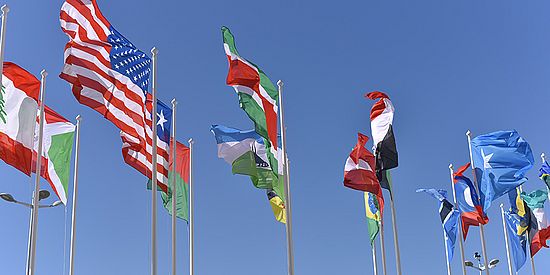

During the master's degree, students will independently investigate empirical questions concerning political phenomena, applying appropriate data collection and analysis methods. Examples of possible thematic areas include comparative foreign policy studies, power and conflict in international organizations, peace and conflict research, or the influence of interest groups in democratic systems. Students can specialize in one or more world regions according to their particular interests.
In addition to conducting independent quantitative or qualitative research on their chosen issue, students will also expand their knowledge of political science and other humanities subjects thanks to a broad range of courses which can be freely chosen from. They also have the option of completing an internship. This degree program prepares students for employment in diverse and challenging occupations in politics, administration, business and the media.
Political science at the University of Basel places a strong emphasis on international relations, as well as comparative studies between and within political systems. Another key feature of the program is that it combines content-related and methodological foundations with specialist knowledge on the student's chosen world region, thereby allowing students to pursue their specific interest in one or more regions. Other key areas of academic focus are democracy, political representation, peace and conflict studies, and the European Union.
This specialized approach enables diverse teaching and research collaborations with other departments within the social sciences. The program's focus on world regions complements and expands upon courses offered by other institutes and faculties. The geographical and cultural aspects of courses offered by the Center for African Studies, the Institute for European Global Studies and the departments of Middle Eastern Studies, Eastern European Studies and Literary studies make them an ideal complement to the political science program.
The master's program builds consistently upon the knowledge of political theory and methods acquired during the bachelor’s program, and consists of four modules. In the Empirical Research Methods module, students will consolidate their skills in data collection and theory-guided analysis. These will then be put into practice as students conduct research as part of the Regional Focus module. Besides conducting independent research, students are expected and encouraged to participate in team-oriented work in study groups. The Further Political Science / Consolidation in Political Science and Further Social Sciences / Consolidation in Social Sciences modules provide the student with a broad range of course options that allow them to develop individual and complementary specializations.
In addition to acquiring subject-specific and interdisciplinary knowledge, students will also learn to independently design and carry out research projects, critically reflect on their research approaches, and successfully convey scientific knowledge and interdependencies both orally and in writing. The concluding part of this program includes a master's student seminar, a master's exam, and, if appropriate, a master's dissertation.
| Degree | MA in Political Science |
| Type | Degree subject |
| Start date | February, September |
| Credit points | 120 |
| Study structure | The Master's degree is the second degree after the Bachelor's degree and comprises a total of 120 credit points (CP). In addition to Political Science, students choose a second, independent subject, whereby both subjects are studied for 35 CP each. The subject in which the master's thesis (30 CP) is written becomes a major, the other a minor. In addition, there are free electives (20 CP). One ECTS credit point corresponds to approximately 30 hours of work. |
| Subject combination | The diverse understanding of theories and methods in political science provides an ideal basis for interdisciplinary study and allows for many beneficial combinations with other subjects. Students may choose a subject from the Faculty of Humanities and Social Sciences or an extra-faculty subject as their second Master's degree subject. Students can choose it according to their interests and appointments. The free electives pass freely selectable courses that can be used to deepen knowledge in the degree subjects, to gain insight into other degree subjects offered by the University of Basel or to acquire language skills. |
| Language of instruction | German |
| Subject area | Political Science |
Admission to master’s programs is regulated by the university student regulations and the stipulations of the individual degree program descriptions. More details of the general master’s admission requirements are provided here.
For students to be admitted with no additional requirements, they must hold a bachelor’s degree worth 180 CP from a higher education institution recognized by the University of Basel.
Subject-related requirements are defined in the admission requirements (section 3) of the study program for the relevant subject. The guidelines may also contain further useful information that is key to successful studies.
Students must register for their bachelor’s or master’s degree program within a specified timeframe – even in cases of delayed registration.
The University of Basel organizes regular information events for bachelor’s and master’s programs. Details can be found on the events page of the Faculty of Humanities and Social Sciences.
Some subject areas also offer their own separate information or welcome events. Please consult the page for the relevant subject area for event dates and locations.
See also factsheets under Documents & Factsheets.
All data subject to subsequent changes.
From researcher to advisor, analyst, PR officer, project manager or media professional, a master's degree in political science opens the door to a diverse and exciting range of careers. These may be in international organizations such as the UN, NGOs, research groups in private sector firms (banks, insurance companies etc.), or in politics, management and the media. In principle, master's graduates will be well prepared for all activities requiring independent, methodical and analytical work.
Those wishing to embark upon an academic career can follow their master's degree with a paid or unpaid <link en doctorate external-link-new-window internen link im aktuellen>doctorate.